I attribute my love of Shakespeare solely to one source: my mom. Our family trips every single year were to the Utah Shakespearean Festival (which is awesome). I was eight when I went to my first plays—I saw A Comedy of Errors, Much Ado About Nothing, and Richard III. I loved them. I absolutely loved it—not surprising, all three of those are fabulous plays. To this day, creepy Richard III is my favorite of them all.
Every year after that I saw every Shakespeare play I could, both at the festival and at local theatre companies. I liked Shakespeare. I was comfortable with Shakespeare. It had become a part of my identity, so when I got to high school and read, Romeo and Juliet, Julius Caesar, Macbeth, and Hamlet, I enjoyed myself (for the most part—okay, I really didn't enjoy myself much during Julius Caesar). Again, it was comfortable. Even when I didn't understand things, I wasn't worried. I was a person who was well-aquainted with Shakespeare, and I can say, without hesitation, that gave me a measure of self-confidence.
Like helping our children appreciate and feel comfortable with poetry and art and classical music and ballet and opera, we really should help them appreciate and feel comfortable with Shakespeare, even if we don't feel comfortable with it ourselves. It will give them a measure of self-confidence. It is an achievement, one not to be sneezed at. (Especially during a play...)
How can you do this with your kids?
Well, first of all, take them to plays whenever you can. The comedies can be watched, I think, as early as eight or nine or ten. Same with the really exciting dramas, like Macbeth and Richard III.
But you can't just go to these plays and not know the story ahead of time. That is the key with Shakespeare—knowing the story ahead of time. Then the words, on their own confusing, somehow make sense, even when spoken quickly amidst the regular, Shakespearean chaos. The emotions of the actors make sense when you know the story: the tears, the laughter, the anger, the madness.
Here are some great retellings of Shakespeare's tales. These are volumes to buy, not just check from the library, because hopefully your kids will reread them and reread them. Shakespeare is exciting. It is intriguing. It is wonderful. These are stories that will captivate if given the chance.
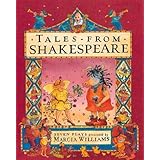
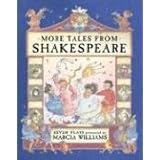

These are graphic novels from Marcia Williams. My kids love them. Even Flannery.
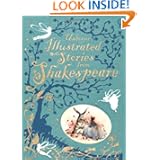
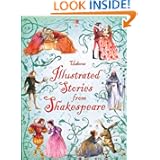
The Usborne Illustrated Stories from Shakespeare—also great. I frequently catch someone with this open, rereading one of their favorites.
Tales from Shakespeare by Tina Packer. I love this version. Love it. The illustrations are awesome—the illustrators who contributed are phenomenal. If you had to just pick one, this is it.
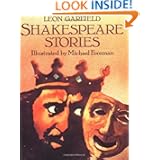
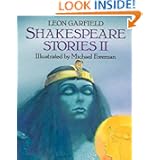
Shakespeare Stories One and Two by Leon Garfield. Great retellings of the most famous plays.
And you can generally find this series, Shakespeare Can Be Fun, at the library. (It's not my favorite, but good introductions to the plays—especially if you are taking your kids to see something.)
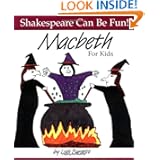
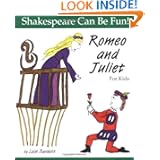
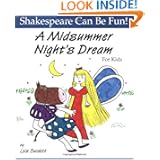
And remember, "If music be the food of love, play on." !!!

Thanks for all your postings. I read your blog regularly!
ReplyDelete